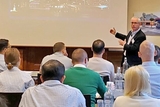

For three decades, Children’s Hospital of Philadelphia (CHOP) has partnered with the Open Medical Institute (OMI) to conduct educational programs that share knowledge with colleagues from around the globe to foster the professional growth of talented medical professionals.
The Open Medical Institute (OMI) is an international initiative for medical professionals that aims to use education and research to improve healthcare on a global scale. Members of CHOP’s Division of Urology collaborate with the OMI to lead unique educational initiatives that advance pediatric urology.
A transatlantic urology partnership
For the past nine years, Thomas F. Kolon, MD, Associate Chief of CHOP’s Division of Urology, and Josef Oswald, MD, Chief of the Pediatric Urology Department at the Hospital of the Sisters of Mercy in Linz, Austria, have co-led the OMI’s seminar in pediatric urology.
This year, two days prior to the OMI seminar in Salzburg, Dr. Oswald hosted Dr. Kolon as a visiting professor at his home institution in Linz. The two physicians spent time on patient rounds, radiologic and pre-operative review conferences, and in the operating room sharing surgical techniques.
“This was a wonderful opportunity to exchange thoughts on medical treatment of pediatric urology patients,” says Kolon. “We all thoroughly enjoyed furthering our medical knowledge in the hope of optimizing our care of the pediatric urology patient.”
The two-day visiting professorship included:
- A lecture by Dr. Kolon on “Nephron-sparing Surgery in Wilms Tumor” in which he presented 3-D printed models of the tumor and surgical reconstruction. The presentation led to a thoughtful discussion on current treatment strategy.
- Dr. Kolon and Dr. Oswald working together to perform a difficult reconstruction of a urogenital malformation of a 14-month-old child. The operation was performed both endoscopically and in an open fashion under magnification. The child recovered in excellent condition after the operation, with no complications and able to leave the clinic within a week.
- The two physicians evaluating cases of hydronephrosis and possible ureterovesical junction by istotopic studies. Subsequently, they discussed different therapy options for the children who needed operations.
“For us, and especially for our younger fellows, the professional exchange with Dr. Kolon was an impressive experience as well as a human and scientific enrichment,” noted Oswald, whose team was impressed by Dr. Kolon’s surgical technique.
The co-directors then made their way to Salzburg for the 13th Annual Seminar in Pediatric Urology, where they were joined by CHOP pediatric urologists Christopher J. Long, MD, and Gregory Tasian, MD. The seminar brought together 29 fellows from 20 different countries and included more than 20 state-of-the-art lectures by high-level faculty.
Topics covered during the week-long seminar included:
- Common pediatric urologic disorders and trauma
- Pathophysiology and treatment of urinary stones in children and adolescents
- Frequently utilized diagnostics and therapeutics in pediatric urology
- Identifying and treating congenital urogenital anomalies such as hypospadias, cryptorchidism, DSD and cloaca
Featured in this article
Specialties & Programs

For three decades, Children’s Hospital of Philadelphia (CHOP) has partnered with the Open Medical Institute (OMI) to conduct educational programs that share knowledge with colleagues from around the globe to foster the professional growth of talented medical professionals.
The Open Medical Institute (OMI) is an international initiative for medical professionals that aims to use education and research to improve healthcare on a global scale. Members of CHOP’s Division of Urology collaborate with the OMI to lead unique educational initiatives that advance pediatric urology.
A transatlantic urology partnership
For the past nine years, Thomas F. Kolon, MD, Associate Chief of CHOP’s Division of Urology, and Josef Oswald, MD, Chief of the Pediatric Urology Department at the Hospital of the Sisters of Mercy in Linz, Austria, have co-led the OMI’s seminar in pediatric urology.
This year, two days prior to the OMI seminar in Salzburg, Dr. Oswald hosted Dr. Kolon as a visiting professor at his home institution in Linz. The two physicians spent time on patient rounds, radiologic and pre-operative review conferences, and in the operating room sharing surgical techniques.
“This was a wonderful opportunity to exchange thoughts on medical treatment of pediatric urology patients,” says Kolon. “We all thoroughly enjoyed furthering our medical knowledge in the hope of optimizing our care of the pediatric urology patient.”
The two-day visiting professorship included:
- A lecture by Dr. Kolon on “Nephron-sparing Surgery in Wilms Tumor” in which he presented 3-D printed models of the tumor and surgical reconstruction. The presentation led to a thoughtful discussion on current treatment strategy.
- Dr. Kolon and Dr. Oswald working together to perform a difficult reconstruction of a urogenital malformation of a 14-month-old child. The operation was performed both endoscopically and in an open fashion under magnification. The child recovered in excellent condition after the operation, with no complications and able to leave the clinic within a week.
- The two physicians evaluating cases of hydronephrosis and possible ureterovesical junction by istotopic studies. Subsequently, they discussed different therapy options for the children who needed operations.
“For us, and especially for our younger fellows, the professional exchange with Dr. Kolon was an impressive experience as well as a human and scientific enrichment,” noted Oswald, whose team was impressed by Dr. Kolon’s surgical technique.
The co-directors then made their way to Salzburg for the 13th Annual Seminar in Pediatric Urology, where they were joined by CHOP pediatric urologists Christopher J. Long, MD, and Gregory Tasian, MD. The seminar brought together 29 fellows from 20 different countries and included more than 20 state-of-the-art lectures by high-level faculty.
Topics covered during the week-long seminar included:
- Common pediatric urologic disorders and trauma
- Pathophysiology and treatment of urinary stones in children and adolescents
- Frequently utilized diagnostics and therapeutics in pediatric urology
- Identifying and treating congenital urogenital anomalies such as hypospadias, cryptorchidism, DSD and cloaca
Contact us
Division of Urology